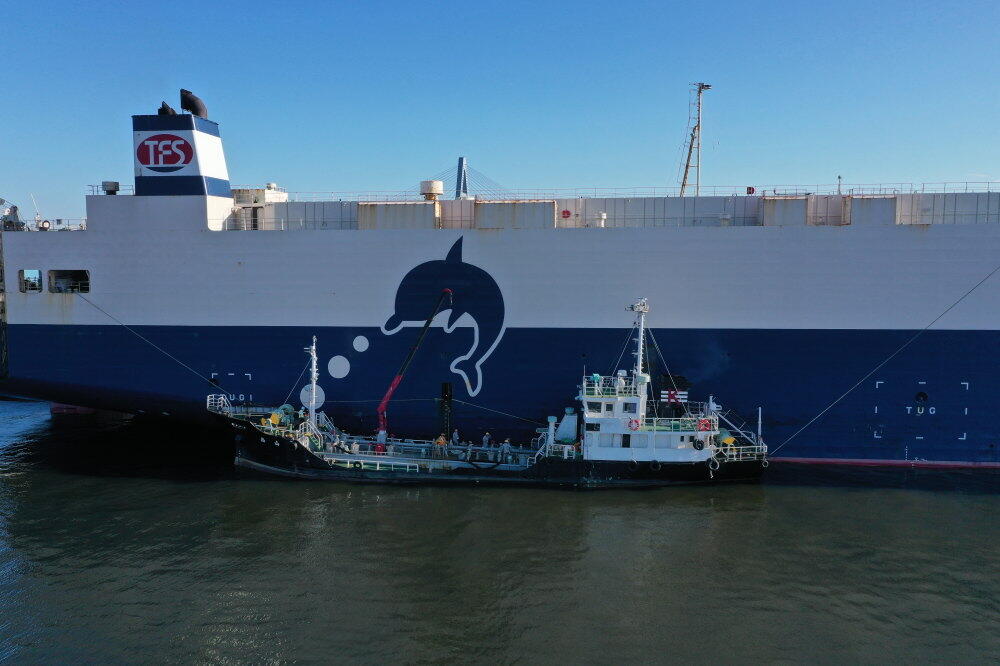Toyota Tsusho Supplies Biodiesel Fuel to Car Carriers at the Port of Nagoya
- Contributing to the Realization of Carbon Neutrality by Reducing Greenhouse Gases from Marine Fuel -
- (former)Machinery, Energy & Project
2022-09-12
Toyota Tsusho Corporation ("Toyota Tsusho") announced today that Toyotsu Energy Corporation ("Toyotsu Energy") supplied marine biodiesel fuel*1 ("biofuel") using ship-to-ship bunkering*2 for a car carrier operated by Toyofuji Shipping Co., Ltd. ("Toyofuji Shipping") at the Port of Nagoya on July 26 and August 3, 2022. This initiative was implemented as part of the "Study for the Promotion of Carbon-Neutral in Coastal Shipping" included in the FY2021 supplementary budget for the Ministry of Land, Infrastructure, Transport and Tourism (Cabinet decision on November 26, 2021). It was the first attempt in Japan to supply blended fuel that combines low sulfur C heavy oil*3 and biofuel for coastal trading vessels.
1. Background
The Japanese government has announced that it will reduce greenhouse gas (GHG) emissions by 46% compared to the 2013 level by 2030 and achieve carbon neutrality by 2050. The target for GHG emission reduction in the coastal shipping sector by 2030 is a reduction of approximately 17% compared to the 2013 level (approximately 1.81 million tons). The government is promoting the conversion of marine fuels from heavy and light oil, which are petroleum-derived, to alternative fuels. Although there are expectations for ships to use hydrogen and ammonia in the medium to long term, due to accompanying requirements such as expensive investments and technological development, biofuel is currently regarded as a viable prospect for carbon-neutral fuel.
2. About This Project
The Toyota Tsusho Group has been a leading force in the shift to alternative fuels for ships using biofuels. Starting with the first biofuel operation trial at the Port of Singapore in April 2021, the Group also supplied biofuels to oceangoing ships at the port in June 2021. In April this year, the Group conducted the trial for a tugboat operating within a port for the first time in Japan. This time, the Group conducted a biofuel supply trial for domestic car carriers at the Port of Nagoya, which handles the largest volume of goods in Japan in order to study the effectiveness of biofuel and decarbonize coastal shipping.
The biofuel that was supplied this time was derived partially from waste cooking oil collected from Toyota Group and Toyota Tsusho Group companies in Japan through cooperation between Toyota Tsusho and Daiseki Eco. Solution Co., Ltd. This initiative also contributes to a circular economy through the establishment of a supply chain with local production for local consumption. Establishing a domestic supply chain and regularly using biofuels, which are decarbonized fuels that can be used directly in ships' existing internal combustion engines, will contribute to the promotion of carbon neutrality in the maritime transportation industry.
The Toyota Tsusho Group will continue to contribute toward the transition to a carbon neutral society by accelerating businesses contributing to the reduction of GHG through the industrial life cycle and promoting initiatives toward carbon neutrality, so as to pass on a better global environment to the children of the future.
[Overview of Toyotsu Energy Corporation]
|
Company name
|
Toyotsu Energy Corporation |
|---|---|
|
Location
|
Nagoya City, Aichi Prefecture |
|
Established
|
July 5, 1969 |
|
Shareholder
|
Toyota Tsusho Corporation 100% |
| Representative | Fumiaki Nakanishi, President |
|
Business description
|
Sales of petroleum products; import and export of lubricating oils; sales of liquified petroleum gas; sales and installation of security equipment; and sales of biomass and liquified natural gas |
|
Website
|
https://www.toyotsuene.co.jp/ (in Japanese) |
 From left, the car carrier "Toyofuji Maru" (Toyofuji Shipping) and bunkering ship "Shozan" (Toyota Tsusho)
From left, the car carrier "Toyofuji Maru" (Toyofuji Shipping) and bunkering ship "Shozan" (Toyota Tsusho)
*1 Biodiesel fuel (BDF)
BDF is a fuel alternative to light oil obtained by methyl esterification of vegetable oil and fat and is expected to serve as an alternative fuel for petroleum-derived heavy oil and light oil. The United Nations’ Intergovernmental Panel on Climate Change (IPCC) views BDF as carbon neutral throughout its lifecycle because CO2 is absorbed in the course of growth of plants, from which BDF is made.
*2 Ship-to-ship bunkering
A method of fueling a ship moored at a quay or pier and a ship alongside by a fuel supply ship sideways
*3 Low sulfur C heavy oil
Heavy oil that complies with the regulations of the International Convention for the Prevention of Pollution from Ships (MARPOL 73/78), produced and marketed by petroleum wholesalers. In order to prevent the effects of gas emissions from ships on human health and the environment, the revision of the MARPOL 73/78 has tightened the regulation of sulfur content in fuel oil used in all maritime zones from 3.5 mass percent or less to 0.5 mass percent or less since January 1, 2020.
- April 19, 2022 release: Toyota Tsusho Performs First Trial in Japan to Supply Biodiesel Fuel to Ships at the Port of Nagoya
https://www.toyota-tsusho.com/english/press/detail/220419_005906.html
- June 29, 2021 release: Toyota Tsusho Performs First Trial in Singapore to Sell and Supply Biodiesel Fuel to NYK Line’s Oceangoing Vessel
https://www.toyota-tsusho.com/english/press/detail/210629_004852.html
- April 22, 2021 release: TTC to Conduct Supply and Operation Trial, a First in Singapore, in Anticipation of Regular Use of Biodiesel Fuel for Ships
https://www.toyota-tsusho.com/english/press/detail/210422_004814.html
The information in this release is current as of the date of announcement.
Please note that information may change after the date of announcement. Thank you in advance for your understanding.



